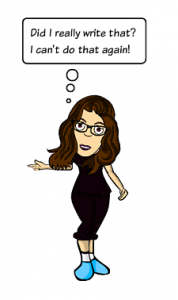
Thank you so much to Professor Michal Zellermayer and the members of the Action Research and Self Study Interest group at the Mofet Institute!
Yesterday I had the honor to present my article for Journal X to the members of the group. Most of the participants are experienced teacher educators and researchers and all have a real interest in the sort of research I am doing. The atmosphere in the group is very supportive, and even though I was the first to present this year, I did not feel threatened or pressured at any stage.
As I approached the front of the room I asked myself a number of questions:
How will my work be accepted?
How does my research fit in under the category of Action / Participatory research?
How will I react to the criticism I will… may hear?
Was this text appropriate for this framework?
and last but not least…
Did I make a mistake volunteering to be the first?
I will begin by answering the last question – No! I certainly did not make a mistake, Presenting my article and receiving thoughtful and intelligent feedback from this group was an incredible honor and supplied me with a lot of material to think about and work on. The changes which were suggested in the structure of the article are similar to those that my supervisors would have suggested (I suppose).
Professor Zellermayer directed the group to look closer at the article using the characteristics of Action Research papers based on the work of McNiff and Whitehead and the analysis proved very useful. The main criticism which arose is that I haven’t spelled out the “What is my concern?” which is motivating my study in general and this article in general. This is one of the differences between a paper which fits in as a chapter in my PhD to a journal article which must stand on its own. This of course is something to consider in every article I attempt to create.
According to Professor Zellermayer and the members of the group, The article should begin with the answer to “What is my concern?” . Again and again I find myself being pulled back to opening my writing with more traditional academic styles and material on the context of the study, where really what I should be doing is plunging my reader into the study with the kind of professional texts which are at the heart of my work. The same thing happened when I wrote my paper for my confirmation process.
I have to take off my doctoral student cap now and replace it with my teacher cap. I hope to continue this reflection on the wonderful feedback I received yesterday as it had motivational value as well as a real push in a positive direction. I received many comments pointing to the strong points in my writing and also concrete comments in the direction of improvement.
Have a nice day!





